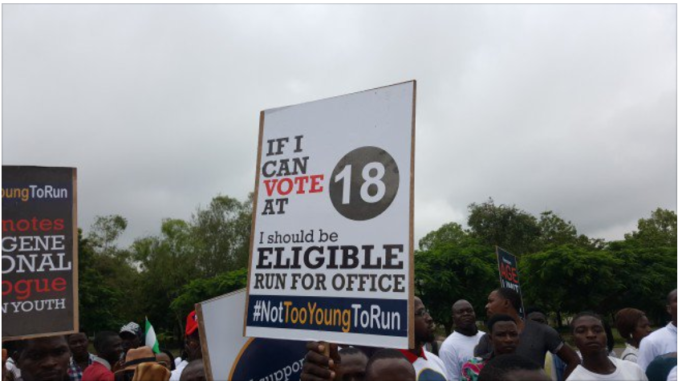
More than one year into the 2019 general elections, the political maneuvering has earnestly commenced. In fact, in Nigeria today, everybody both online and offline are already stricken with political fever and the frenzy of the 2019 elections. Unlike other parts of the world, where the demand for democracy seems low, Nigeria’s case is different. There’s renewed demand for democracy and a heightened quest for good governance and better leadership. The yearning for better leadership after 18 years of democracy is predicated on the failure of the two dominant parties that have steered the affairs since 1999. The People’s Democratic Party (PDP) ruled Nigeria for 16 years yet development eluded the country. The ruling All Progressive Congress (APC) will be 3 years in office in a couple of months and Nigerians are yet to experience the promised ‘‘change’’. It is this failure of government to deliver democratic gains to the people that led to the new quest for quality leadership couched in the new popular lingo in Nigeria political lexicon “The Third Force”.
What exactly is the ‘Third force’? Is it a new ideology, political party or a movement? Is the Third Force capable of disrupting national politics in a way, democracy can eventually begin to deliver development to all Nigerians? Since last year, several groups have emerged positioning themselves as the Third Force. It started with the Emerging Leaders Conference, National Intervention Movement (NIM), Red Card Movement, Revive Nigeria to the newly espoused Obasanjo’ Coalition for Nigeria. These groups have one thing in common, Nigerians are tired of bad governance and in need of good leaders. However, what remains absent is a visible plan on how to morph into a political party or evolve as a mass movement sweeping out bad governance.
In recent times, we have seen the determination of the citizens, in particular, young people and their readiness to actively participate in the forthcoming elections. We are witnesses to the increasing turn out of intending registrants in the ongoing continuous voter registration (CVR) exercise and collection of Permanent Voter cards. According to the INEC chairman during the launch of European Union Support to Democratic Governance project in Abuja, the CVR exercise recorded a whopping 1 million registrants in 3 weeks. This only confirms the belief people have in the “power of their votes” as a means of asserting sovereignty.
Back to the big elephant in the room, who is the real “third force”? I submit the real third force is Nigerian youth and they will determine the outcome of the 2019 general elections. Politics is a game of numbers and unfortunately for the actors, youth comprises 52 percent on the voters register in Nigeria. I know many will be quick to discountenance this assertion claiming young people will vote for any political party or political actor based on what they get. The context is fast changing as young people are gradually recognizing the power they wield in the political process. The emergence of Emmanuel Macron of France, Sebastain Kurz of Austria and George Weah of Liberia as heads of government inspires young Nigerians.
The leaders of these groups claiming to be the Third Force obtain legitimacy from young people. Without the youth, there is no Third Force. The influence of the ruling political class is determined by the extent of their mobilization of young people to serve their political interests. These groups will leverage on the youth energy and tap their resourcefulness to ascend to power and turn around and exclude them when they assume office. The protagonists of the Third Force and politicians alike are deploying diverse tactics to get the youth vote in the next elections. What they fail to appreciate is the fact that young people understand the importance of politics and they are taking intentional steps to engage by strategically negotiating for power. There is broad-based consensus in the youth movement that youth exploitation for political gains must stop.
We launched the Not Too Young To Run campaign and built it around the singular issue of youth inclusion in political processes. The campaign is not limited to removing age barriers for running for office rather it is about rediscovering our citizenship and redressing the age-long inequality that has plagued Nigerian democracy. It was also about ending corruption, diversity management and everything that is bad in the polity to rebuilding the country for the common good. The movement was a silent revolution by young people to rebuild the country. 2019 elections will no doubt be an eye opener for the political class. In fact, this is an open advice to the political class, brandishing the Third Force as an identity is not a guarantee of winning votes especially if the vehicle through which the ambition will be prosecuted is replete with politicians laden with political baggage.
The yearning of the youth is simple, it is a Nigeria, that is not built on ethnic, regional or religious pacts; a country where pursuing daily livelihood is not contingent on geographical extraction; a country where politics is inclusive, a country where public wealth are not filtered away by a thieving elite. Presently, the numbers are in favor of the youth and this should not be easily dismissed. There is a lot of galvanizing by civic groups such as YIAGA Africa, Connected Development, Not Too Young To Run/Ready To Run movement, Emerging Political Leaders Summit, Youngstars Foundation etc. The rationale is to push the huge numbers to vote not just on issues but for candidates with clearly defined metrics to measure success. Uniting the youth constituency is a priority. When youth unite, they positively disrupt politics. Nigeria needs that disruption to move its politics to another level. This is the shift towards restructuring Nigeria.
Itodo is an election and constitution-building enthusiast. He is the convener of the Not Too Young To run movement. Send comments and feedback to sitodo@yiaga.org He tweets @DSamsonItodo
END

Be the first to comment